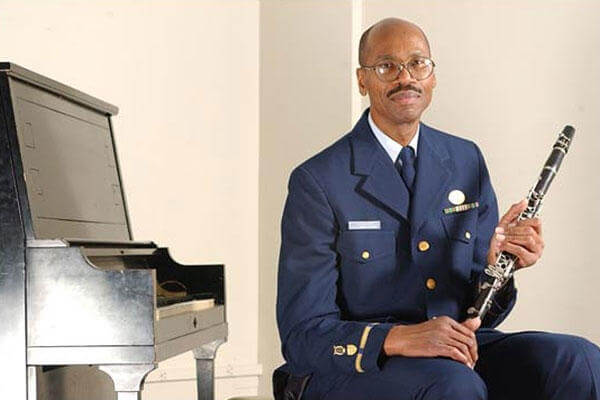COAST GUARD ACADEMY, New London, Conn. — For the tall and lanky Chief Warrant Officer Kirk Edwards, the furthest he's migrated to live is from his hometown in Madera, Calif., to the Coast Guard Academy in New London, Conn., when he joined the Coast Guard Band more than 24 years ago. This wasn't exactly an earth-shattering African-American experience for the 49-year-old Coast Guard musical virtuoso, but a typical military move. And he's only had to do it once.
But in the larger scheme of things, the "push" and "pull" of migrations do matter. They shape a people, a place and a collective national heritage. Migrations took an active role in Edwards' family history spanning two generations and possibly, three. The mobility of the Edwards family is emblematic of hundreds of years of 13 distinct African-American migration shifts in this country, according to historians working with the Schomburg Center for Research in Black Culture in New York. This broad story is the central theme to a recently launched website titled, "In Motion: The African-American Migration Experience," rich with links to manuscripts, photos, essays, maps and illustrations chronicling the African-American Migration Experience.
In what was typically known as the Great Migration, 1.5 million black people moved from South to North between 1916 and 1930. But another major Diaspora, called the Western Migration, occurred between 1840 and 1970. During that time, many families, including the Edwards, headed as far west as they could for what they hoped were greener pastures and a chance at a better life.
Family oral history tells of Edwards' maternal grandparents migrating from Texas and his paternal grandparents migrating from Louisiana for both families to settle in Oklahoma. Life was good and fairly prosperous until the Depression, which was followed by the Dust Bowl in the 1930s. Approximately 50 percent of the nation's black workers became unemployed and Midwestern farms dried up in what seemed to be an endless drought. The only chance for survival for both black and white families was to move further west to California.
The Edwards family joined many others in California's Central Valley, the agricultural capital of the state. "There were so many families from Oklahoma on the outskirts of town it was nicknamed 'Little Oklahoma,'" recollects the bespectacled musician of his Madera childhood. To this day, many families in Central Valley trace their heritage back to Oklahoma.
Edwards' paternal grandparents were fortunate; some families never fully recovered from the Dust Bowl's long-term damaging economic effects. Blacks were the last ones hired and the first ones fired. These were difficult times. Even with a small successful farm in Madera during the tail end of the Depression and the Dust Bowl, the Edwards family had to deal with then-prevalent Jim Crow segregation laws.
With his family mired in poverty during his formative years, Edwards' pursuit of music wasn't easy in rural Madera. A back injury from construction work left Polete Edwards, Kirk's father, unable to support his family. While he underwent several major back surgeries, the family went on welfare.
"We were very poor and couldn't afford musical instruments at home," the shy and soft-spoken musician sadly relates. "My only access to instruments was at school, and few minorities were in the band."
But poverty and racism didn't stop the Edwards family from sharing a love for music. Edwards' parents, DeLois and Polete, both sang in gospel groups and quartets. His father played the tuba, while a young Kirk practiced on the clarinet, which he now plays professionally. A faint smile breaks across his kind face when memories flood back of how his father tried to teach him clarinet using a tuba. "It was hard to understand because the keys were different," he says.
Brother Keith remains at Central Valley in Fresno, Calif., and is band director of his alma mater Edison High School. At the height of his career in the Coast Guard Band, the 6-foot, 4-inch Edwards was primarily a clarinetist, but also played the saxophone and the flute. As an arranger and composer, his piece, "Trilogy to Martin L. King," was published by Cimarron Music and Production in Dallas.
As Director of the Coast Guard Academy Cadet Bands since 2000, Edwards leads the NiteCaps Jazz Band, the Concert Band, the Regimental Band, and the Windjammers Drum and Bugle Corps. The Groton, Conn., resident is also the director and founder of the Academy Gospel Choir. In addition, he's also the chairman of the Academy Human Relations Council, a position where he doesn't have to perform musically.
At a recent gospel choir rehearsal, a fatherly Edwards patiently taught his young and not-so young charges to maintain their vocal pitch while he accompanied them on an old, but functional piano. His fingers, the color of pecans, slowly, but surely, tinkled the ivory keys. "I can't play the piano well," he sheepishly admits. "I'm teaching myself this new song I started two days ago." According to Edwards, professional musicians specialize in a particular instrument, but academically, they must have fundamental knowledge of all band instruments.
"I love everything-all types of music-Jazz, classical, and, I love gospel," Edwards humbly declares. "I don't mind rap music as long as there's no profanity in the lyrics." Even with his busy schedule at the Academy, he finds time to be a very active performer in Southeastern Connecticut. He can be seen performing with a wide variety of musical groups playing the typical genres he loves, including Latin/Brazilian jazz and popular music. Because of his skill, dexterity, and outright compassion, he finds himself frequently asked to be a guest performer at church services.
With a myriad of responsibilities, Edwards works many late hours and weekends rehearsing. Sacrificing for his love of music, he spends his time passing on the generosity and kindness of strangers tendered to him when he used to be a struggling student artist.
"He gives his own time for personal lessons with band members on a one-on-one basis," says Cadet First Class Richard Szoka, NiteCaps commanding officer and senior band member. "He has this way with people that convey his love of music-not just jazz, but all types that is almost infectious."
"His high energy, warm personally and great enthusiasm keeps the choir working together in a family atmosphere," says First Class Cadet Marlon Chichester. "For that, we love him and greatly appreciate the positive way he's influenced our lives." Since their formation last spring, the choir has enjoyed great success and much kudos for their successful performances at neighboring Connecticut College and in-house performances.
Despite his family's financial struggles and the nation's struggle with race, Edwards was able to pursue academics in his chosen vocation through work-study (working as much as 40 hours a week), a small scholarship in high school, grants and loans. He even got some cash by entering and winning a clarinet competition in college. Hard work and perseverance finally paid off when he earned Bachelor's Degree in Music from California State University-Northridge in 1980, after transferring from Fresno City College. Following the path of his son, Polete Edwards also earned a bachelors degree four years later at California State University-Fresno.
"There were only about ten minorities (Black and Hispanic) in the music program at Northridge," he reminisces. "I was fortunate because of kind-hearted people who took the time to help me, teach me and give me access to instruments I couldn't afford." He was accepted in the Coast Guard Band the following year, and in 1998, completed his Masters Degree in Music at the University of Connecticut.
Someday, he hopes to able to work on this doctorate…when he finds the time.












